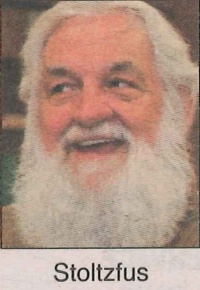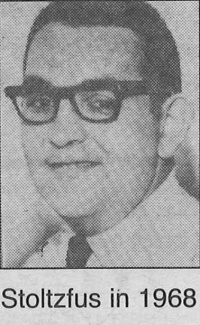If this site was useful to you, we'd be happy for a small donation. Be sure to enter "MLA donation" in the Comments box.
Stoltzfus, Gene (1940-2010)
Mennonite Weekly Review obituary: 2010 Mar 22 p. 1, 7
Birth date: 1940 Feb 1
text of obituary:
By Celeste Kennel-Shank
Mennonite Weekly Review
CHICAGO — Gene Stoltzfus, founding director of Christian Peacemaker Teams and an international human rights activist, died March 10. He was 70.

His heart stopped while he was riding his bicycle near his home in Fort Frances, Ont.
During his tenure as CPT director from 1988 to 2004, Stoltzfus helped establish an organization for the peace churches and other Christians with a vision that peacemakers ought to be willing to take risks to stop violence.
His 45-year career included years of service in Vietnam and the Philippines, as well as directing U.S.-based peacebuilding organizations. Stoltzfus traveled to numerous conflict zones and contributed to training hundreds of peacemakers.
In the early 2000s, he visited Afghanistan, Pakistan and Iraq, listening to survivors of war and learning about the effects of armed conflict there.
Stoltzfus led CPT as it carried out international projects in places such such [sic] as Chiapas, Mexico, and Haiti, as well as work in U.S. cities, including Richmond, Va., and Washington.
Tears and laughter mingled as Stoltzfus' colleagues in the CPT office remembered him.
Kryss Chup, CPT training and publications coordinator, who worked with Stoltzfus for 27 years in three organizations, saw Stoltzfus as a visionary.
"Gene brought together a unique combination of that vision with profound grassroots experience," she said. "The vision had a comprehensive practicality about it as well."
Some CPT workers remember receiving phone calls from "God" with a deep voice on the other end asking them to consider taking part in a CPT project. They then realized it was Stoltzfus.
"It was one of Gene's humorous ways of connecting to the heart of people," Chupp said.
Stoltzfus modeled nonviolence in love of those who could be seen as enemies, Chupp said.
"I saw this over and over and over again when he was engaged with authority figures or those seen as the opponents, and he just broke through," she said.
Southeast Asia service
After graduating from Goshen (Ind.) College in 1962, Stoltzfus began his career in Vietnam from 1963 to 1967, working in education and community development as a conscientious objector with International Voluntary Services, a secular organization that received U.S. government funding.
Earl Martin, who served in Vietnam with Mennonite Central committee beginning in 1966, recalled that Stoltzfus and a group of other IVS volunteers in leadership roles resigned as a statement against the Vietnam War, calling attention to its harm to Vietnamese civilians.

"They were real pioneers in raising a strong voice as to the effect of U.S. military presence in that country," martin said in a phone interview. "The Vietnam experience really did help Gene understand the nature of power and the ends to which a powerful nation will go to try to defend its perceived interests."
Martin observed Stoltzfus as being at ease talking to high-level government officials around the world as well as drinking tea with farmers and fishers in villages.
"While he was engaged in very serious work, he never took himself very seriously," Martin said. "He saw himself as one actor among a whole community of people working for peace around the world."
After Vietnam, Stoltzfus lived in Washington from 1967 to 1972, working as a lobbyist and speaking around the United States "to let people know about the humanity of Vietnamese people," said Dorothy Friesen, whom Stoltzfus married on April 4, 1975. "Even before the war ended, Gene was coming to the conclusion that where the real difference was going to be was at the grassroots and among people of faith."
He left lobbying and went to Associated Mennonite Biblical Seminary in Elkhart, Ind., where he earned a master of divinity degree in 1973.
"He was able to reach deeply into his Anabaptist tradition," Friesen said in a phone interview. "At the same time, he had a really deep respect and appreciation for people of other traditions."
Stoltzfus and Friesen directed MCC's program in the Philippines from 1976 to 1979 during the period when there was martial law.
Moving to Chicago, Stoltzfus and Friesen took part in founding Synapses, a grassroots peace and justice organization building international connections.
Myrla Baldonado recalled finding Stoltzfus in Chicago in the mid-1980s to thank him for campaigning for her release from detention in the early 1980s in the Philippines. She now lives in Chicago and is international coordinator for the Alliance for Bases Clean-up, advocating AAU.S. responsibility for toxic waste at its former military sites in the Philippines.
Baldonado organized a CPT exploratory delegation to the Philippines in 2006 in which Stoltzfus participated, bringing a mix of sharp political knowledge and a great sense of humor, she said. He showed a good side of Americans to people who had seen a bad side, she said.
"It was such a joyful presence," Baldonado said. "He was Santa Claus to everybody."
With his laughter, full belly and big white beard, Stoltzfus played a convincing version of the Christmas figure.
Once, at the beginning of a CPT campaign against violent toys, Stoltzfus dressed up as Santa Claus and began removing items from the shelf of a toy store. When asked by a store manager what he was doing, he said Santa Claus didn't approve of war toys, his CPT colleagues recalled.
"It's that kind of humor and audacity that cuts through and unmasks these issues so often," Chupp said.
Beginnings of CPT
In 1984, author and scholar Ron Sider exhorted listeners at the Mennonite World Conference assembly in Strasbourg, France, that if Anabaptists believe they have an alternative to war, they ought to be willing to take risks as soldiers do.
Stoltzfus was willing to take those risks, and already had.
"He took an idea, which was there, and implemented it, and it's now a reality," Sider said in a phone interview. "He demonstrated that it in fact can make a difference. I'm truly grateful for that contribution."
Mennonites and the Church of the Brethren established CPT in 1988, with more supporting churches to follow.
Carol Rose, CPT co-director, aid Stoltzfus shaped the organization in a way that has helped it survive today, even in a tough economic climate.
"One of the things Gene built from the ground up is a large base of sustaining supporters," Rose said. "Thousands and thousands of them."
Those supporters allow CPT to rely mostly on individual donations rather than grants for its funding, she said.
"Gene really believed in the power of prayer," Rose said. "We do all this careful organizing, and the Spirit of god multiplies that."
After retiring in 2004 to Fort Frances, Ont., Stoltzfus continued to speak and write, including on his blog, peaceprobe.wordpress.com
Stoltzfus was born Feb. 1, 1940, to Elmer and Orpha (Beechy) Stoltzfus and grew up in Aurora, Ohio.
He is survived by his wife, Dorothy Friesen; brothers Robert Stoltzfus of Orrville, Ohio; Edward Stoltzfus of Harrisonburg, Va.; and Glenn Stoltzfus of Goshen, Ind.; and a sister, Sara Ellen Stoltzfus of West Liberty, Ohio. He was preceded in death by siblings Dwight Stoltzfus and Evelyn Miller.
Memorial services are planned in the United States, Canada and the Philippines, as well as other countries. One will be held at 2 p.m. March 18 at Knox United Church in Emo, Ont., and another at 3 p.m. April 11 at Waterford Mennonite Church in Goshen, Ind.